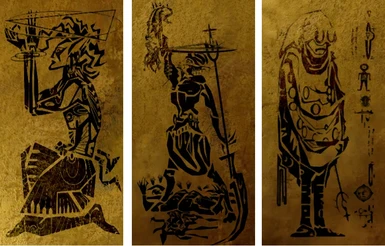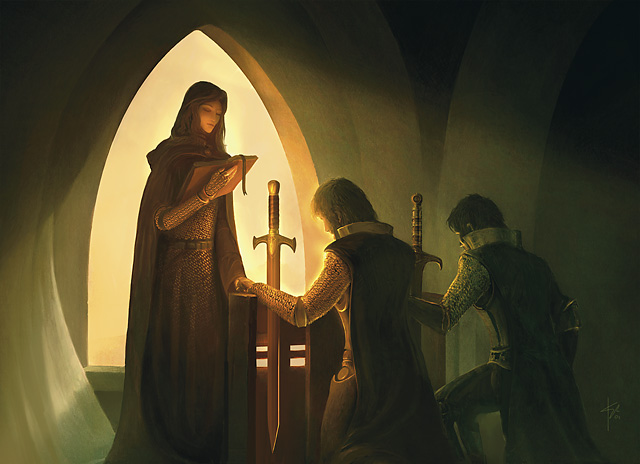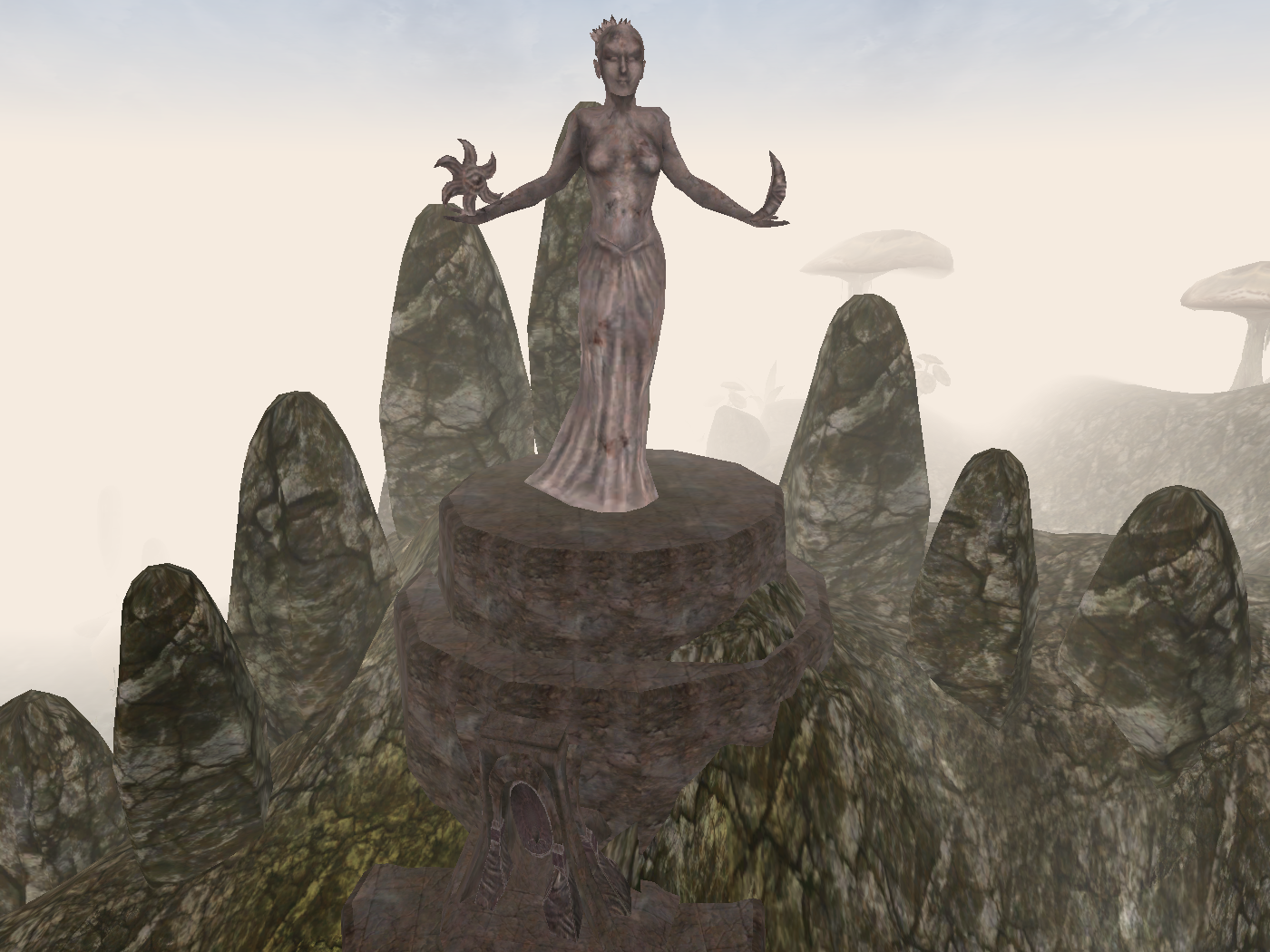 |
Guardian Angel
This idea started with Arnold K's Cleric, which gains the Guardian Angel ability with its first template. Critically (and I consider this to be one of Arnold's best ideas to date) the Guardian Angel is not the cleric's ability, but one belonging to the whole party. By default, it is a single die healing spell which can be cast by any party member. The purpose of this is to free up the cleric as a healbot to do other things, as well as giving other party members reason to take up religion.
This idea was bouncing around my head for a while, but I couldn't find a place to fit it until I decided to do a test run of my Elder Scrolls GLOG system (if you want to see it in action, it's the #to-morrowind channel under Game Channels).
For those unfamiliar, the Elder Scrolls doesn't have clerics. There is healing magic, but that's another branch of magic along with fireballs and levitation. There is turning undead, but that's in the same magic domain as summoning undead. Actual religious organizations are made up of a mix of wizards, fighters, sneaks, diplomats and merchants.
More importantly, religion in the Elder Scrolls is weird. It is weird and wonderful and bizarre, exactly the kind of weird fantasy religion Arnold advocated in Towards a Better Cleric. And I want my players to get involved with it without necessarily joining one of the temple factions. I want them to familiarize themselves with it, to explore and seek out new aspects of it.
The solution I came up with was the Shrines. TES 3 Morrowind had shrines dotted about the world, including in tomb dungeons, each tied to a god or, more often, saint. The presence of the shrines, whether Dunmer or Imperial, demonstrates who holds influence in the local area, and makes the religious conflict tangible to the player.
In adapting them to GLOG, I streamlined them a fair bit. Now, each altar to the Imperial pantheon or shrine to the Dunmer Tribunal provides a choice 'blessing', in addition to healing diseases or poison for a fee. The shrines to the numerous Dunmer saints, on the other hand, which are by far the most common, each have a single 'blessing' they provide.
Blessings
Every blessing is a floating single-die spell, gained for free by praying at a shrine and maintaining the strictures of that saint or pantheon (more on that later). The die returns when the party takes a long rest, like normal. The party may have a single one active at a time. If the party wishes to have more than one, they will have to split the party religiously.
Example 1: Alice, Bob and Charlie are followers of Saint Roris. So long as they maintain his strictures of piety, generosity and condemnation of Argonians (Saint Roris has some chips on his shoulder) they gain a floating Fortify Health spell. However, Alice wants to switch to the faith of Saint Meris, who grants resistance to the terrifying, incurable Corprus disease spreading across the land. Bob is convinced, but Charlie is frail and likes having the extra hit points available. Alice and Bob switch to worshipping Saint Meris, with her strictures of piety, mercy and honor in battle. Now, they can cast the spell to resist contracting Corprus, while Charlie can cast Fortify Health. Mind you, Charlie can still cast it on Alice and Bob, and vice versa, but it takes the action of one of the faithful.
It is also possible to add more dice to the spell. By making a valuable sacrifice, you can add more dice to that blessing for the duration of that day. When the day is past, it degenerates back down to a single die, even if the spell wasn't cast. I picture this being used at the opening of a dungeon, or in the morning before an expected tough encounter. It's also great for roleplaying and atmosphere. If the PCs sit down to pray and sacrifice some of their hard-earned gold or loot because they anticipate they'll need some help from above, the system is working right.
 |
Sacrifices
5/10/15gp for each additional die up to 4, so getting a 4MD spell costs 30gp total. This is substantially cheaper than a scroll of the same power (80gp) but unlike a scroll, it only lasts for a day and you don't have a great selection in spells to cast. On the bright side, it takes up no inventory slots and can be cast by any party member.
How exactly a party makes this sacrifice is up in the air. If the party prepares ahead of time, they may buy sacrificial materials ahead of time. Valuable sanctified meat, or special liquor, or fine wooden icons, or anything else that can be quickly and decisively destroyed, in units of 5gp apiece.
In the absence of that, the players may sacrifice their gold or other valuables in some way, such as throwing them into a lake or chasm, burning them to slag, etc. The players may even enter a sacrifice-debt, vowing to sacrifice some amount of treasure they gain in their endeavor after the danger is passed. Of course, going back on the vow or trying to recover what you sacrificed is grounds for losing the saint's blessing, and a curse besides.
 |
Strictures
How else would you lose your blessing? By violating that god or saint's strictures. I like to keep it simple, with just three. Generally, piety/resilience of faith is one. A form of generosity or altruism specific to that saint or deity is another. This isn't 'always be a goody-two-shoes', but puts the players on the lookout for certain struggles and problems. Finally, a special quirk of that cult which makes maintaining the strictures unique and somehow challenging.
Going back to the Discord Morrowind game, here's how I presented the shrine in the opening dungeon to my players:
Example 2: The room also contains a small shrine to the Dunmer Saint Roris. A prayer book is open before it.
The prayer book in front of the shrine opens to the story and strictures of St. Roris. Apparently, he was a Dunmer warrior who was captured by Argonians and tortured, but never gave up his Tribunal faith. His death at the hands of Argonian sorcerers caused the Arnesian war. Today, he is the patron of furnishers and caravaners.
A favorite prayer of St. Roris the Martyr
Alone with none but you, my Gods,
When countrymen are gone.
By the tricks of beasts my faith increased
Oh queen of dusk and dawn!
More safe am I within your hands
Than if a host did round me stand.
Strictures of St Roris
Take upon yourself the burdens of those weaker than you
Never allow another to challenge your faith.
Daily curse the depravity of Argonia and its people.
Another incomparable, for Saint Meris, requires that the PCs allow their enemies to surrender, never setting an ambush.
 |
Conclusion
To condense this all down:
The party may follow a saint or god of their choosing by praying at their shrine and maintaining their strictures. This grants the party members which follow that god a floating spell which any of them can cast. It is a 1MD spell, unless the party sacrifices to increase the number of dice up to 4. Violating the strictures results in losing the blessing until the party can make amends. Trying to recover a sacrifice results in both losing the blessing and a curse of the GM's choice.
Sacrifice rates: 5/10/15gp for each additional die, up to 4.
Adapting to other rulesets
I know, I know. I said this wouldn't be GLOG-exclusive, and here I go talking in GLOG terms. Luckily, adapting this to other systems is simple enough. If you use spell slots, then the blessing begins as a first or second level spell, whichever feels right. The spell levels should increase with sacrifices. The rates for sacrifice should be substantially less than a comparable scroll.
You may wish to have more than one slot of the same level, so that it can be used more than once a day. Tweak it, mess with it, I think the system has value.




0 Yorumlar